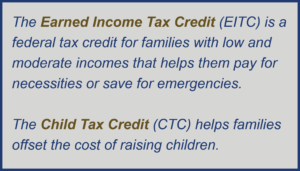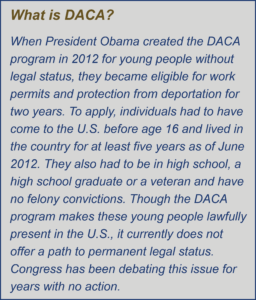Key Takeaways
- The changes made to the Earned Income Tax Credit (EITC) and the Child Tax Credit (CTC) under the American Rescue Plan (ARP) are targeted to help those with low and moderate incomes and have the potential to lift millions out of poverty.
- The EITC excludes Individual Tax Identification Number (ITIN) filers, and the CTC excludes undocumented children; these segments of the community tend to be the most vulnerable, and they are being cut off from much needed relief.
- All immigrants were hit hard by the pandemic, had high levels of unemployment, and extending the tax credits to include more families would help millions nationwide.
 Tax credits, specifically the EITC, have been called one of the greatest safety net programs to come out of government, and they help lift millions out of poverty. Historically, people contribute portions of their earnings to our tax system, and every year families can use their return, including any tax credits received, to pay off outstanding debts, get ahead on bills or save for a rainy day. Recently, the CTC was changed to a monthly benefit so that families do not have to wait until the end of the year to receive funds. Hopefully, the same will happen to the EITC as well. In the future, the EITC and the CTC both have the potential to be even better credits that target individuals and families with low to moderate incomes.
Tax credits, specifically the EITC, have been called one of the greatest safety net programs to come out of government, and they help lift millions out of poverty. Historically, people contribute portions of their earnings to our tax system, and every year families can use their return, including any tax credits received, to pay off outstanding debts, get ahead on bills or save for a rainy day. Recently, the CTC was changed to a monthly benefit so that families do not have to wait until the end of the year to receive funds. Hopefully, the same will happen to the EITC as well. In the future, the EITC and the CTC both have the potential to be even better credits that target individuals and families with low to moderate incomes.
During the pandemic, the EITC and the CTC have been strengthened, alongside stimulus checks, to help families survive these difficult times. Under the American Rescue Plan (ARP), the tax credits have been temporarily adjusted to meet the needs of millions of families with children and individuals with low incomes. For example, these credits are now completely refundable; the credit amount has been increased, and more individuals have been able to take advantage of the credits.[1] The expanded EITC and the CTC under the American Rescue Plan also help support racial equity across the country and particularly in a Deep South state like Georgia, which has a long history of systemic racism.[2] In Georgia alone, 227,000 Black and 34,000 Latinx Georgia workers have benefitted from the expanded EITC, and 790,000 Black and 349,000 Latinx Georgia children have benefitted from the expanded CTC.
How immigrants have been excluded from federal pandemic relief
Although the EITC and CTC are powerful anti-poverty tools, certain immigrant groups will not benefit from the enhanced tax credits provided for under the ARP and have generally been excluded from federal pandemic relief. For example, undocumented immigrants were not able to receive any of the stimulus checks issued in spring 2020 to help them weather the pandemic, with U.S. citizens and lawful permanent residents (LPRs) also denied checks if they were married to someone who was undocumented or had a parent who was undocumented. For the second round of stimulus checks issued in late 2020 and early 2021, some improvements were made regarding who was eligible to receive aid. Because of those improvements, 2.2 million U.S. citizen or documented immigrant children are now able to get the money they are owed regardless of having a spouse or parent who is undocumented.
In spite of the changes made under the ARP, the EITC continues to exclude the undocumented because they are unable to obtain a Social Security Number. While the ARP extends the EITC to reach even more people with low incomes, it does not make it accessible for those who could file their taxes with an ITIN. This effectively could exclude around 310,000 undocumented people from being able to take advantage of this credit that is meant to help financially vulnerable communities, and which amounts to as much as $1,500 per filer.
 Likewise, the CTC, even with the ARP improvements, continues to exclude large numbers of undocumented immigrants even as families begin to receive their monthly CTC checks. While undocumented parents with an ITIN are able to receive this credit for their U.S.-born or Deferred Action for Childhood Arrivals (DACA)-recipient children, those parents will not be able to do the same for their undocumented children, leaving over 15,000 undocumented children under the age of 15 both ineligible for the tax benefit and age-ineligible for DACA.[3] This problem is compounded by the recent ruling in Texas that made the future of the DACA program uncertain for new would-be applicants, meaning that as undocumented children become age-eligible for DACA, they may be barred from applying and hence may never qualify for the CTC. The combination of tax and immigration policy means that a Georgia undocumented family would miss out on as much as $3,000 to $3,600, which factors to $250 to $300 dollars a month per child depending on age.
Likewise, the CTC, even with the ARP improvements, continues to exclude large numbers of undocumented immigrants even as families begin to receive their monthly CTC checks. While undocumented parents with an ITIN are able to receive this credit for their U.S.-born or Deferred Action for Childhood Arrivals (DACA)-recipient children, those parents will not be able to do the same for their undocumented children, leaving over 15,000 undocumented children under the age of 15 both ineligible for the tax benefit and age-ineligible for DACA.[3] This problem is compounded by the recent ruling in Texas that made the future of the DACA program uncertain for new would-be applicants, meaning that as undocumented children become age-eligible for DACA, they may be barred from applying and hence may never qualify for the CTC. The combination of tax and immigration policy means that a Georgia undocumented family would miss out on as much as $3,000 to $3,600, which factors to $250 to $300 dollars a month per child depending on age.
Policy recommendations
To ensure all families can receive the aid they deserve, lawmakers must support policies that help bridge the gap and underscore the urgency to act quickly.
First, Congress should extend the EITC to people who file their taxes using an ITIN. By letting ITIN filers take advantage of the credit, it not only helps undocumented people, but also student visa holders and employment visa holders. The purpose of the EITC is to help alleviate poverty while also encouraging people to work. It may also encourage more people to file their taxes because they are guaranteed to get something in return.
Congress should also allow undocumented children to qualify for the CTC using an ITIN. The IRS does allow legal guardians to apply for a tax ID number for minors. This is routinely done for non-citizen adoptees when they are being adopted by U.S. citizens. However, they could extend this service to undocumented children. The main reason these children are unable to claim this credit is because they lack a Social Security Number which makes it difficult for the U.S. government to know they exist. Until there is a permanent immigration solution, ITINs are proven to be a suitable substitute for Social Security Numbers, and it allows the government to keep track of where payments are going and how much.
Finally, Congress should make the changes to the CTC and the EITC under the American Rescue Plan permanent. Congress needs to pass the appropriate legislation and the American Families Plan in order to ensure the maximum amount of relief. The ARP expanded the CTC and EITC to include more people and targeted the need to those with low to moderate incomes to ensure that the credit goes to those who would benefit greatly. However, this expansion was only meant to be temporary to help families and individuals during the pandemic. That is why passing policies that strengthen the CTC along with the American Families Plan is so important: It makes these changes permanent, and it has the potential to lift millions out of poverty and help keep them out of poverty.
The time to act is now. Georgia’s undocumented families need immediate relief to ensure they make it out of this pandemic with the resources they need to succeed. They entered the pandemic under difficult circumstances following years of deportations and destructive immigration enforcement, especially through the 287(g) program. In addition, the public charge rule discouraged many immigrant families from seeking public benefits to which their children were entitled, and which would have provided increased economic stability to immigrant households.
In addition, more than 50 percent of Georgia’s undocumented people live below the poverty level, and 170,000 undocumented Georgians are essential workers who have placed themselves at risk to provide for others during the pandemic, only to see their economic circumstances crumble. In 2020, the national immigrant unemployment rate nearly tripled to 9.2 percent from 3.1 percent in the previous year. Immigrant women have had to withstand the worst of the pandemic’s effect on the workforce. Immigrant women with children six years of age and younger have an unemployment rate of 11 percent whereas the year before they only experienced 4.5 percent unemployment. The increased unemployment rate for immigrant women is especially concerning as they are more likely to live in poverty when they are the sole caregiver in their family. Despite the hardship, undocumented immigrants in Georgia paid a combined $862.6 million in state, local and federal taxes in 2019. Yet they and their children continue to be overlooked, even while simple and actionable policy fixes to the EITC, CTC and other anti-poverty tools are within reach.
Endnotes
[1] For refundable tax credits, any amount of the credit that exceeds a taxpayer’s tax liability is refunded to the taxpayer. Under ARP, in terms of the CTC, it means that the full CTC is available to all children except those who have the highest incomes. For the EITC, it means that far more low-paid workers without children receive the refund.
[2] Structural racism is a collection of discriminatory policies and racial biases across several facets of life negatively affecting the outcomes of people of color. Areas of life impacted by structural racism include but are not limited to access to the safety net, health care, family-sustaining jobs and wages, housing and education.
[3] These children are still too young to apply for DACA, and some may never be able to qualify because they do not meet the requirement of being here since 2007. The recent ruling in Texas also makes the future of DACA uncertain for new would-be applicants.








